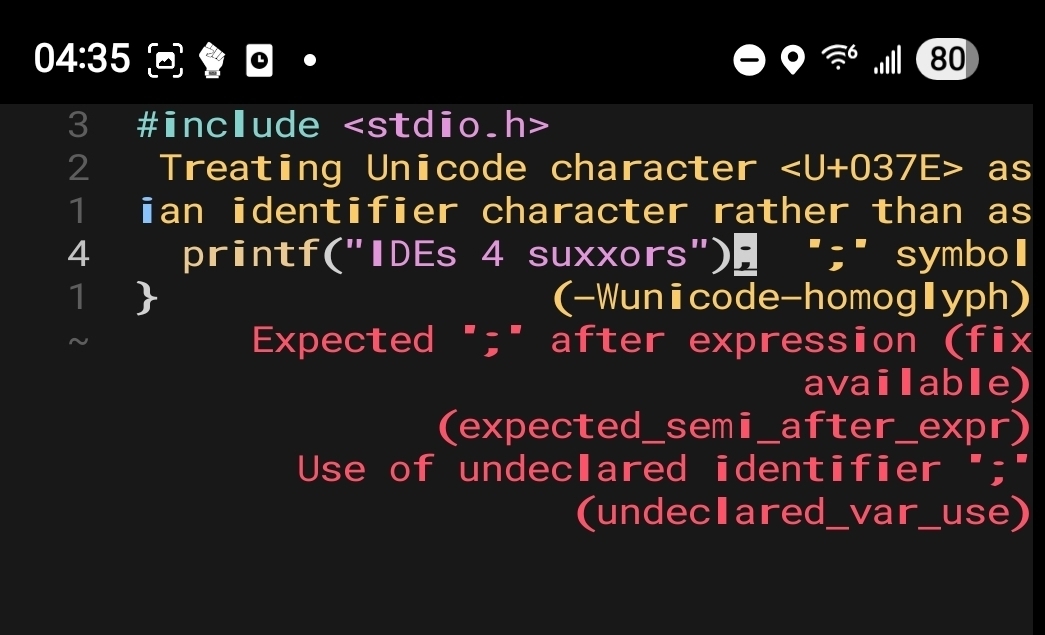another good one to sneak in there... thai zero-width space: U+200B
cant see it, nothing reads it, and it makes everything error. : D
Post funny things about programming here! (Or just rant about your favourite programming language.)
another good one to sneak in there... thai zero-width space: U+200B
cant see it, nothing reads it, and it makes everything error. : D
Hmm .. we should start collecting these.
Anyone know of an existing list?
Came here to say fuck the zero width space. I spent 90 hours in the depths of solr looking for this fucker who brought down our entire search index.
I deal with shy hyphens a lot. They don’t display unless there’s a line break, so they get copied from various word docs or websites and end up in a database somewhere waiting to piss me off.
I'm guessing that they pasted code from inside Microsoft Word.
No. CMS updated to support new character set while solr did not. Not enough sanitization.
The right to left mark (U+2000F) can also be fun.
Pretty much any ide will spot that. Maybe you can use it to teach your colleagues not to use a plain text editor.
I'm gonna need the vi guy to teach me how to get this functionality in nvim pls--don't make me leave
The plugin YouCompleteMe would show a warning on that line
Thank you masterchief Veidt! (I had to do it, best name ever)
You can pry my vim and nano from my cold, dead hands!
^(I use an ide sometimes)^
In VSCode (yeah yeah MS bad, I have to use it for work) it puts a yellow box around the charcater, which I don't immediately recognize the meaning of and highlights the line as "identifier "blah;" is undefined". It's not like your gunna spend all day on it, but that could waste a couple minutes if the dev wasn't paying close attention, which is "fun prank" territory.
Can you choose to use VSCodium instead? It's practically identical, but isn't controlled by MS.
The reason it's de facto mandatory is due to some in house extensions, assuming they work with this I could, but I also don't particularly care about my privacy on a work machine. But I will be checking this out for my personal stuff!
I mean sure, but it'll still likely leave 'em scratching their heads for a while before they go "I guess I just.. replace the semicolon..?"

That's the plain text editor Helix. In a terminal. Over ssh. On my phone. Which I can do because I'm not using a dumb IDE.
Developing on a phone sounds like one of the most unpleasant experiences I can imagine. And I include dinner with my ex.
It absolutely would be. It is, on the other hand, occasionly useful to be able to pop in and change a config file, many of which are actually Turing complete languages. What I do far more often, though, is SSH into remote, headless servers and write code there, which is exactly the same as doing it from a phone, only much more comfortable.
fr*cking rust ruining the fun 

You can't err out rust.
Okay fuck you op
IDE users pretending compilers don't exist.
$ guix shell gcc
[env]$ g++ test.cpp
test.cpp:4:16: warning: `0;' is not in NFC [-Wnormalized=]
4 | return 0<U+037E>
| ^~~~~~~~~
test.cpp: In function ‘int main()’:
test.cpp:4:16: error: unable to find numeric literal operator ‘operator"";’
test.cpp:4:18: error: expected ‘;’ before ‘}’ token
4 | return 0;
| ^
| ;
5 | }
| ~
Look ma, no IDE! 😸
;
;
Tried to figure out which was which by googling, but it seems they are both read as semi colon, however you can see the difference in the characters. Wild
I don't see a problem
#include <iostream>
#define ; ;;
int main(){
std::cout << ";\n";
}
Whoa the font on the Lemmy web UI actually renders them differently!
With the "wonderful" tooling at work, we use Skype for Business. Naturally, that is not the primary place to send around code and configs, but a 1-liner or 2-liner happens.
You can't believe the nonsense it does when you try to copy & paste it. Spaces get turned into non-breaking spaces etc. Looks completely normal when pasted directly into vim on a console, but will give "odd" error messages.
Skype still exists?
At this point, even Microsoft wants them to stop using it, but they are stubborn and try to keep it running until they turn off the lights the hard way.
Any half-decent editor/IDE/command line tool will scream at you about this; plus there's version control which should help you spot it as well.
There is no wise way to use that information.
But the foolish ones could be entertaining.
Wow!
This seems to be further evidence that the process for assigning UTF entities has been thoroughly corrupted.
You can (apparently) copy/paste this on mobile:
";" (Greek question mark)
";" (Semicolon)
You can even render it in HTML:
;
;
And it's included on Wikipedia, because of course it is:
Because I'm not sure what my mobile client will actually do with this comment, here's the link to the HTML entity I used:
Also there's plenty of other character joy to be had:
If I don't understand what's happening here but want to, should I research Unicode in general or something else?
Unicode is a way to encode the things that humans use to write stuff into a computer.
ASCII is for example another way, as is EBCDIC.
All these methods translate squiggles that we've used for centuries into something that can be represented inside a computer.
For example, the letter "A" is under ASCII represented by the number 65.
This post is pointing out that there are two characters that look identical, but have different numbers, which means that what the user sees is identical, but what the computer sees is different.
This is the basis for much tomfoolery.
What exactly do you think you can do with this?
Chaotic evil linting rules
Take someone’s source code, replace all semi colons with Greek question marks and see if they can compile. But as others said, any IDE will help.
mess with whoever has the least modern ide? I'm sure there's something else too hold on
Would probably be more effective to mess with Linux config files that use semicolons. Especially if it's run as a daemon because Systemctl doesn't always return helpful error messages for configuration errors.